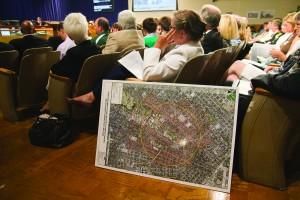No headline provided

June 8, 2012
Tulane University filed suit against the city of New Orleans on May 16 in opposition to an interim zoning district motion enacted by the New Orleans City Council, which could delay plans for an on-campus football stadium.
“The May 3 motion could be treated as a final decision under the city’s Comprehensive Zoning Ordinance, triggering the 15-day appeal period provided by the CZO,” said John Landis, of Stone Pigman Walther Wittmann, the law firm representing Tulane. “Tulane wanted to take no chances that it would be prevented from appealing the City Council’s motion to establish an IZD.”
Tulane’s lawsuit came one day after the university and Mayor Mitch Landrieu announced that they will hold three community forums to lay out plans for the proposed 30,000-seat stadium and field questions and comments from the New Orleans community. The university will conduct the forums on June 6, June 18 and July 11. The June 6 meeting is set for 6 p.m. in Richardson Memorial Hall, Room 201.
“These programs are designed to allow inclusive community participation,” said Yvette Jones, executive vice president for University Relations and Development. “I know from previous meetings with our neighbors that we will have a wide-ranging conversation that will allow us to address, and hopefully resolve, any areas of concern.”
The Interim Zoning District motion, passed by a 4-2 city council vote May 3, directed the City Planning Commission to consider an amendment to current New Orleans zoning laws. The amendment would prohibit the construction of any university structure in excess of 250,000 square feet of gross floor area and a footprint of 50,000 square feet within residential areas.
An amendment would affect Tulane, Loyola, Dillard and Xavier universities, though Tulane’s on-campus football stadium is currently the only project that would be in violation.
Until the City Planning Commission reviews the IZD amendment, Tulane cannot apply for a stadium construction permit, potentially delaying the planned groundbreaking in January 2013 and the fall 2014 completion date. The commission will hold a public hearing June 12 to allow discussion of the IZD and then prepare a recommendation for the city council within 45 days. The city council must then vote to accept or reject it within 120 days.
The stadium’s proposed location is adjacent to Audubon Boulevard, between Turchin Stadium and the Reily Student Recreation Center. Community concerns about the location’s close proximity to surrounding residences prompted the city council’s motion.
“This is not about having no stadium,” Audubon resident Katie Crosby said. “It’s about a thoughtful, well-planned stadium that the community can live with.”
Tulane President Scott Cowen said that the IZD is “unfair, anti-development, discriminatory and fraught with unintended consequences.” He said he left the May 3 city council meeting frustrated.
“We’re in the chicken and egg position with the neighbors,” Cowen said. “If we had done all our homework and then gone to them, we would have been criticized [by residents saying], ‘You did all this and you didn’t get any input from us.’
“The other side of the coin is you go to the neighborhood as we’ve been doing and saying, ‘What are your concerns?’ They tell us their concerns and then we work on them. But they get frustrated because they want answers today that we don’t have. We don’t want to give them half-baked answers. We want to give them complete answers.”
Cowen said that the proposed IZD would not affect the Howard-Tilton Memorial Library expansion but that he did not know if it would affect the proposed new dining hall and residential hall, because plans for both buildings had not been finalized. It is unlikely either project would be big enough to conflict with the IZD.
In the hours after the motion passed, the New Orleans Saints and New Orleans Mayor Mitch Landrieu voiced support for Tulane’s on-campus stadium and opposition to the IZD respectively. Landrieu reinforced his support for the project and the community forums in a May 15 press release.
“I applaud Tulane for taking this step,” Landrieu said. “As is customary in large-scale projects before the city, it is our goal for the university and neighborhood to come together to have a thoughtful discussion of each side’s concerns. I intend to work aggressively with Tulane and the neighbors to ensure that its parking and traffic plans make sense and minimize impact on the surrounding neighborhoods. But we cannot and should not stall progress.”






















Leave a Comment